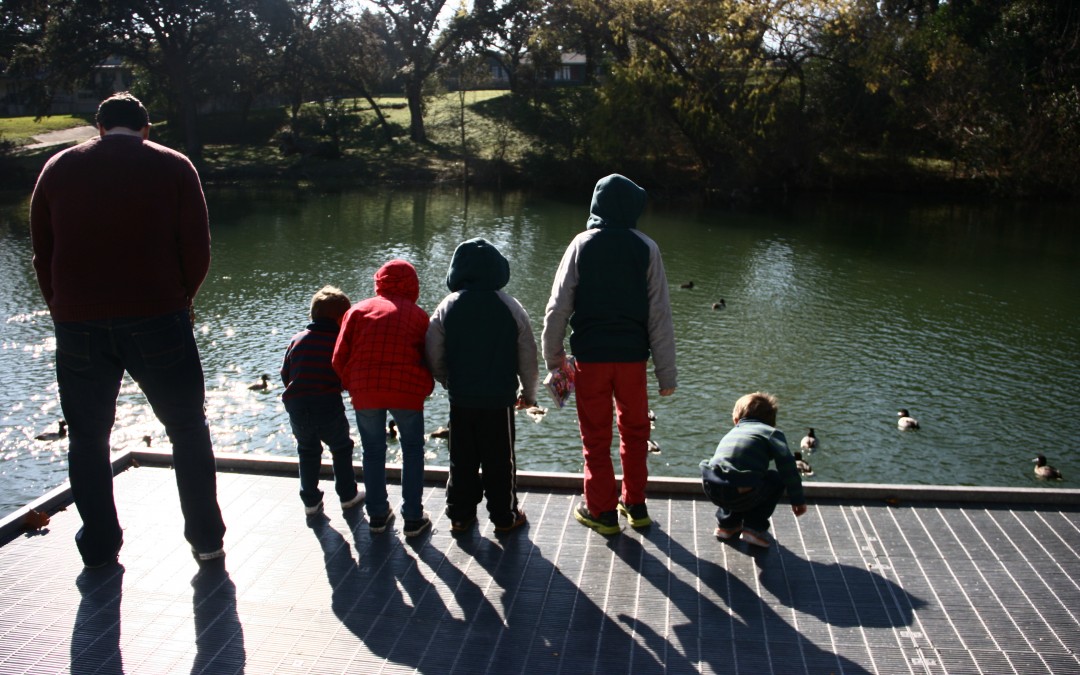I recently made a few waves with an essay I’d written in response to a friend venting to me about how her girlfriends kept saying that their husbands were going to babysit their kids so they could have a girls’ night out. Apparently, it struck a deep nerve.
I feel like there’s something more that needs saying, so indulge me for a moment while I work it all out.
My husband is not a babysitter because he’s a parent. We’ve already established that. But how about we break this down a little, so, at its simplest, it looks something like this:
A parent knows what he’s doing.
It seems that not only have we, as a society, gotten so used to seeing mom as the sole caretaker of her children, but we have also gotten used to believing dad is an incompetent caretaker.
We see this everywhere. We see it in the public men’s restrooms that have no changing station included, because men, of course, would not know how to change a diaper. We see it in the lack of paternity leave at most businesses (maternity leave’s not much better, but that’s another subject for another day), as if no father in his right mind would want to spend those early weeks helping his partner and acclimating himself to this new dynamic of family. We see it in our TV shows and our movies and our commentary on clueless celebrity dads who carry their children all wrong (who of us really knows what we’re doing the first time out of the gate, anyway?).
So maybe this is where the real problem lies, why both men and women express outrage at seeing men put on pedestals for taking responsibility as a parent—because, the truth is, men don’t want to be there. They don’t want to be held up as an exception when they’re just loving their kids the best way they know how, and some days that’s taking care of the explosion that happened in their six-month-old’s pants, and some days that’s mopping up the puke that happened in the hall, and some days that’s teaching a kid to ride a bike or roller blade or drive.
Of course we want to thank them for their contribution. Of course we want to acknowledge that they’re doing a great job as a parent, same as we are. Of course we want to make sure they know how beautiful it is to see a dad loving their kids with his time.
But what our “Dad’s babysitting tonight” and our “Your wife is so fortunate to have a helper like you” does is it unconsciously undermines who men are as parents. Babysitters and helpers don’t know their children. Babysitters and helpers don’t have to stick around. Babysitters and helpers don’t make decisions about what to do with the kid who’s getting beat up in school or how to handle the not-turning-in-homework conundrum and where to put the baby until he’s sleeping through the night.
Husband and I are fortunate enough to split our days down the middle (Not everyone is able to do this. That’s okay. Our schedule is not the point of this essay, so don’t get lost here.). We do things differently as parents, though we share the same core philosophies. The kids know what to expect when a parent takes over the parenting shift. They know that I don’t like a lot of noise, so if they want to wrestle or play freeze tag, they better do it out back. They know their daddy doesn’t care about noise as much as I do, so they know they can play music through the loudspeakers and try to talk over the music if they want. They know their daddy makes them read stories in the home library while I prefer they read in their rooms with me, on my lap. They know they can probably get away with some things when Husband’s on duty that I would never tolerate, and vice versa. We have different preferences because we’re different people. Our kids adjust accordingly.
But just because we do things differently doesn’t mean I’m a better parent than he is. It doesn’t mean he has no idea what he’s doing. In my house, Daddy knows what to do when a kid stubs his toe on the curb, and he knows where the school papers belong (recycling or keep-it-forever?), and he knows how to read a story so a 3-year-old will pay attention. He knows how to teach kids about multiplication tables and metaphors and the proper way to dance “Whip It Nae Nae,” and the deeper things, like love and honor and respect and grit and perseverance and identity.
It seems that we’ve traveled a little too far down this path of Dad as the joke, Dad as little more than useless, Dad as a bungling idiot. It’s time to change this perception, too.
I know men who don’t have sole custody of their kids, and they want nothing more than to be more than a babysitter for their kids. I know men who stay at home while their wives work full-time, and they want nothing more than to be seen as competent caregivers. I know men who are serious about their parenting and just want to be seen as responsible dads.
DADS KNOW WHAT THEY’RE DOING, SOCIETY. We should let them do it.


